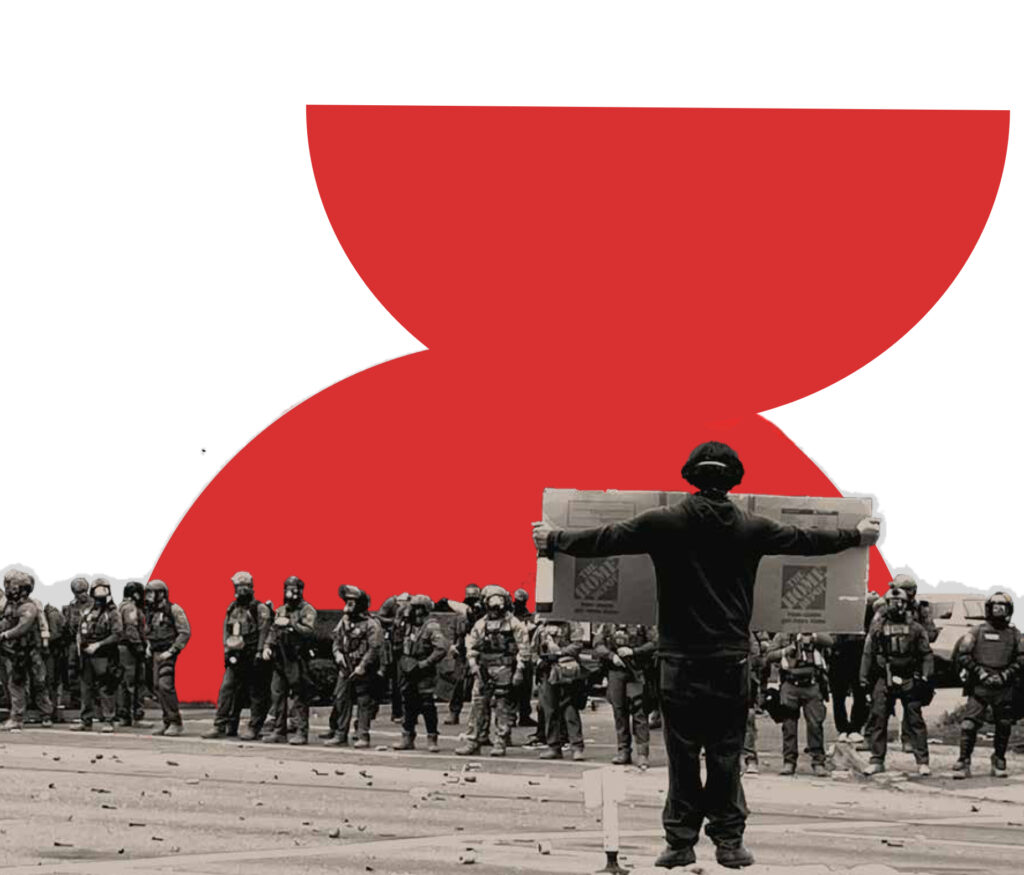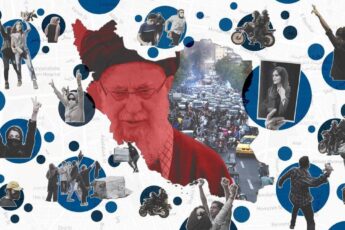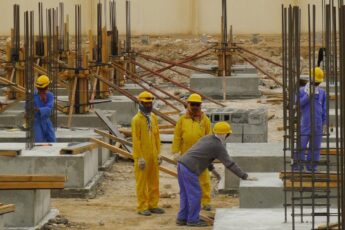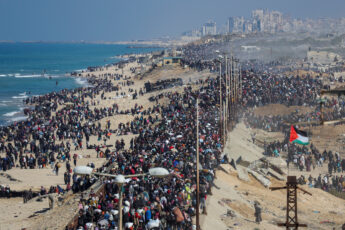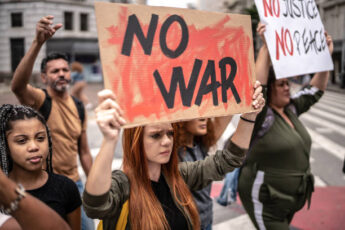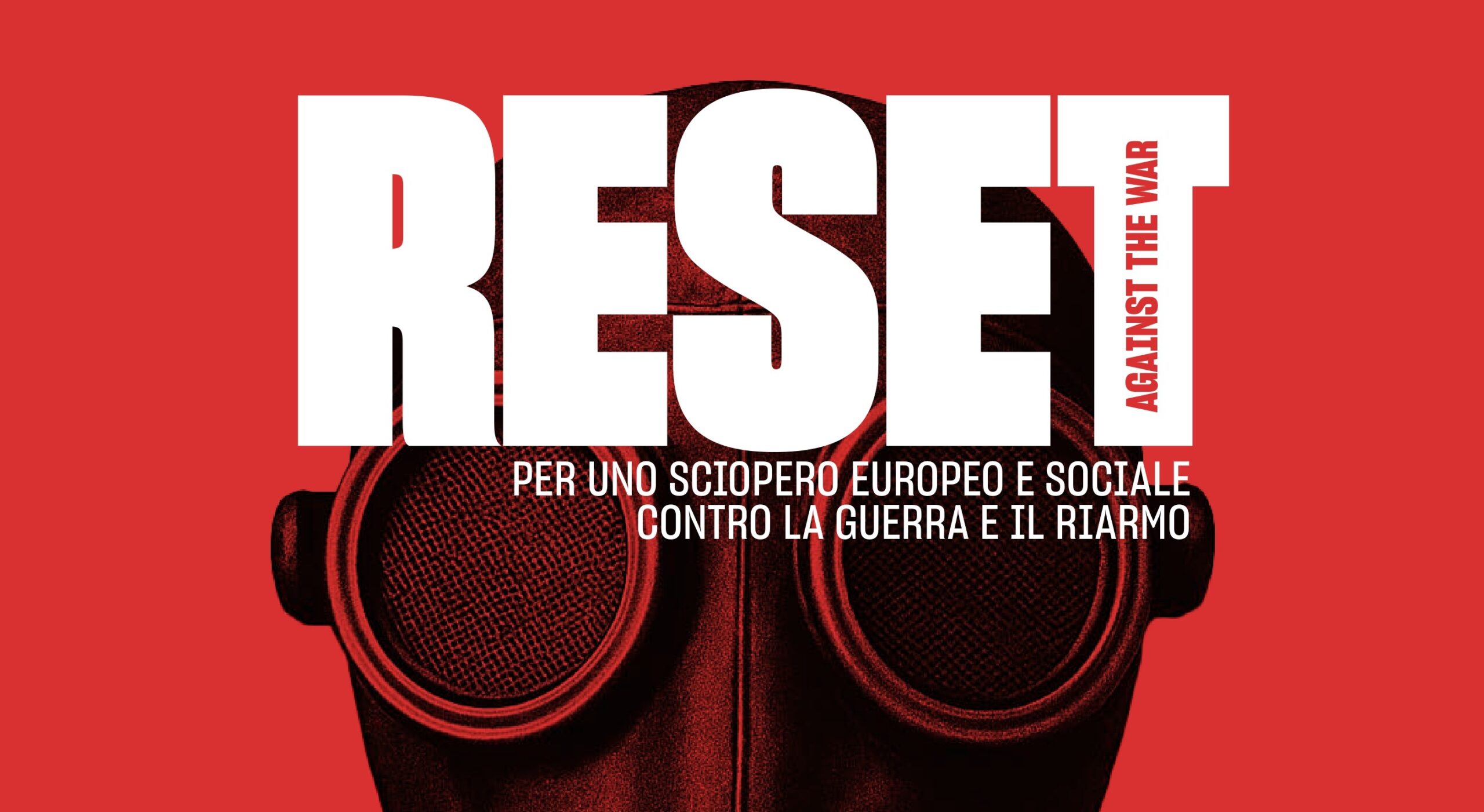
ITA: Per uno sciopero europeo e sociale contro la guerra e il riarmo
We publish a text written by the Reset Against the War network that on June 21st, was distributed during the national demonstration in Rome, StopRearm – NO WAR, REARMAMENT, GENOCIDE, AUTHORITARISM.
Reset Against the War (Network for the Eco-Transfeminist Social Strike against the War) aims to challenge and confront the disorientation that has affected movements over the past three years, placing the war at the center of the discussion. Because war produces a violent reassertion of hierarchies and social roles, coercion to work and exploitation, and a restriction of spaces of liberation, from which only states and capital can benefit, it is then necessary to build a politics that can finally create a space for communication among social subjects — precarious workers, migrants, women, and LGBTQI+ individuals — who everywhere are bearing the effects and social costs of war, and who reject these through their actions and demands.
The aim of this network becomes increasingly important in these days, as we are witnessing yet another quantum leap in World War III. Israel’s repeated bombing of Iran, Trump’s ultimatum to the ayatollahs’ regime and the recent USA bombings, the support by France and Germany and other European states for Israeli operations, the undisturbed continuation of the Palestinian genocide as well as the conflict in Ukraine, the increase in Iranian repression against activists – which at times echoes what is happening in the USA against migrants and students: all of this imposes on all social movements and those who are not content with the present deadly state of affairs to speak out massively, collectively and in an organized way that cannot stop at the mere criticism of European rearmament policies.
It is necessary to give voice and organization to our side, the side of those who pay the most violent effects of war, the side of workers, of women, of LGBTQI+ people, of students fighting against the militarism that invades schools and society, of migrants who challenge racism and border violence every day: the side of those who fight for a present and a future of freedom. A European strike against the war is the challenge that RESET poses to everyone. A strike capable of breaking the attack on living labour that rearmament policies mean, a strike capable of organizing the rejection of war inside and outside the workplace, in reproduction, across national borders. A European strike against war as a chance to overthrow the present of death, exploitation, racism, patriarchy, and environmental devastation that continues to affect our lives.
For a European and social strike against war and rearmament
War looms over our lives. The continuation of the conflict in Ukraine, the intensification of occupation and genocide in Palestine, the outbreak of conflict in the Middle East after Israel’s attacks on Iran, and the struggle for a new division of African resources are tearing apart Congo. Many war theatres are showing us a fractured world, in which disorder daily upends the lives of millions of people. In this same world, states and large tech companies lead a new arms race that drains research and resources: from China preparing the army of the future to North African countries to Europe. Those who thought war was someone else’s problem and not ours must now reconsider. War penetrates our societies, changes state budgets, demands sacrifices, makes research complicit, and silences every alternative.
What we face is not merely a sum of multiple war scenarios but a general response to the irreversible crisis of accumulation processes and command mechanisms of capital over living labour and social reproduction, triggered by the 2008 financial crisis and further accelerated by the pandemic. War is an attempt to “restore order,” never fully succeeding, amid many crises acting simultaneously on the ecological, economic-financial, geopolitical, institutional, and social levels, and related to transnational processes that transform and erode state power. Behind the flexing of militarism and armies’ muscles is the attempt to reconfigure social relations, certainly not to the advantage of women and men, precarious workers, and migrants.
In the drama of the moment, we recognise war and its contestation as a decisive testing ground for organised movements and anyone who wants something beyond the misery of this present. This war devastates and kills, but is fought within society, not only on battlefields. We are not stunned subjects before the drums of armies; we are not residual matter behind the strategies of generals and governments: we are the women, men, and LGBTQI+ people who can overturn the war table, stop its expansion, and transform the dark sky of the present into a common project of liberation. We denounce, criticise, and condemn those who bomb, destroy, kill, and also those complicit in this machine of death—but we cannot stop there.
Grasping what is at stake is crucial today to avoid being trapped in the logic of the enemy, in the geopolitics of fronts and blocs, in the reasoning of states, in the homogeneous and monolithic representations of peoples, identities, and all those subjects operating under the shadow of capital.
Organizing an opposition to the war
Opposing war and its logics today is the starting point for every struggle that aims not to be merely residual and reactive: opposing the ordering claims of militarism, patriarchal violence, racism, exploitation, and environmental devastation is the starting point for making peace a real horizon of struggle beyond any shareable but insufficient moral evocation. We need to build – practically – another politics, with a capacity for transnational organization that can finally produce a communication plan among social subjects – precarious workers, migrants, women, and LGBTQI+ people – who everywhere suffer the social effects and costs of war and reject them with their behaviors and demands.
Organizing opposition to war, imposing its end, and stopping genocide means today refusing every recruitment into its fronts, valuing current struggles, and activating more powerful ones, thus finding shared words to produce initiative. We don’t need to call upon overused slogans, insufficient or even counterproductive, but to build a shared discourse and practice capable of dealing with differences among organized subjects, social conditions, and geographies. Avoiding, deserting, and resisting is no longer enough: what is necessary is building the conditions for those affected by war and its logics of exploitation, racism, patriarchy, and environmental devastation to converge, gain strength, and overturn.
This makes it crucial to position ourselves beyond national borders, to rethink internationalism beyond the tradition of internationalism itself. While we may consider the policies carried out by governments or the conditions we face in territories and metropolitan spaces hateful and in need of response, it is no longer delayable to regain a capacity for transnational imagination and action. This means not only recognizing that we are all caught in processes acting on this dimension, but also understanding that here we can find the necessary strength to counter those processes.
Europe as a minimal space of struggle and movement
We oppose the European Union’s rearmament plan and the NATO summit that aims to decide its details, pushing member states to increase their military spending. However, our opposition must aim to overthrow a war-driven Europe that goes far beyond the rearmament plan and imprints its code of exploitation, authoritarianism, patriarchy, racism, and environmental devastation on society. Being part of elaborating a discourse and practice of transnational and European struggle capable of looking at Europe beyond its institutional borders is an integral part of opposition to war. The war scenario has once again made clear how human rights today represent a mere rhetorical tool that the EU continues to flaunt while allowing Italy to make Albania a detention center for migrants, establishing lists of “safe” third countries to deport to, and continuing agreements with the genocidal Israeli state. Sovereignist governments promote explicitly neo-authoritarian policies that directly strike the formal democratic envelope: rule of law, pluralism, freedom of information, and separation of powers. However, the authoritarian twist affects all European governments in different forms, even the most “democratic,” embodying itself in racist, patriarchal measures and militarism that seeks to impose a present of poverty, exploitation, and to close all spaces of opposition and struggle.
This erosion of democracy signals an epochal change affecting all states and everywhere pushes for new protagonism of executive bodies over parliaments, inserts governments into networks of supranational relations and decisions in which their maneuvering space is increasingly limited, restricts movement and freedom spaces, reinforcing command and obedience. We do not cheer for “the worse, the better,” nor believe that what governments do is indifferent. But we know that neither resurrecting democratic representation nor a hypothetical Europe of rights will help us win a new liberation politics. This does not mean we should stop demanding from national and European institutions what we need, reclaiming spaces of freedom and justice, but we must organize our strength beyond that, to take more than they are willing or able to give.
To the sterile opposition between Europeanists and non-Europeanists, we respond by saying that we must necessarily organize within this Europe, knowing that we must do so against it and also beyond its institutional borders.
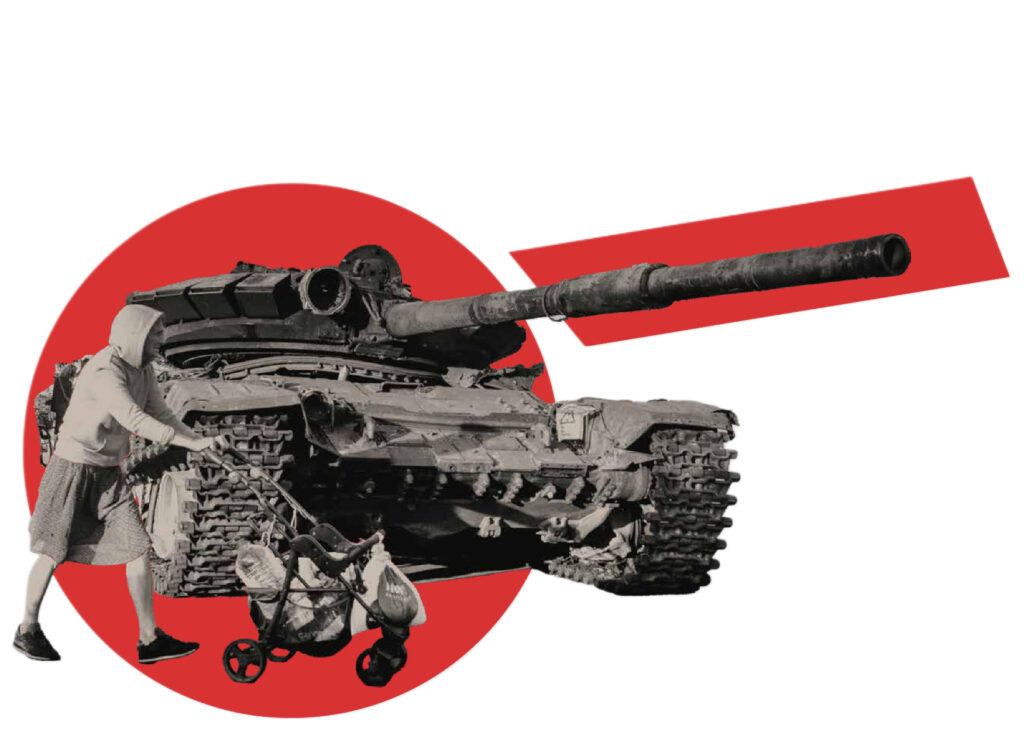
Beyond rearmament
With the ReArm Europe plan, the burden of war will enter even more directly into the budgets and policies of the European Commission and member states, albeit with different rhythms and intensities among countries. But the wild arms race – that the plan aims to accelerate and finance – does not simply serve to prepare the EU for the enlargement of a global military clash. Certainly, rearmament plans produce war tools and enrich arms producers. However, overall, the ReArm Europe plan primarily represents one of the tools through which social disciplining policies will be intensified on a European scale. We must be able to read the thread linking what we see happening around us, the thread connecting different conditions and realities, to oppose it with our connections and organization.
ReArm Europe is not only a militarist industrial plan that aims to subjugate production, research, social spending of states, and EU funds to war, but it is also part of a broader intensification of control over living labor and social reproduction. The authoritarian and criminalization measures we have seen in Italy with the Security Decree, the attacks on protests against genocide in Gaza seen in Germany, the constant threats against non-conforming bodies violently imposed on LGBTQIA+ subjects—explicitly supported by European governments—the institutional racism and deportation policies against migrants that characterize Commission and European state policies (including outside the EU like the UK): all these are pieces of the new European puzzle marked by harsher exploitation, coerced labor, and precarity as the only possible horizon.
But what lies behind the showing of muscles by states and the Commission? It would be wrong to think they signify strength, just as it would be wrong to see them as signs of great weakness. The growth of militarism, constant calls for security, and identification of enemies who take the form of migrants, women, trans people, workers, and anyone displaying non-conforming behaviors – from universities to suburbs – mainly express the search for new social disciplining tools and thus coercion to labor to guarantee accumulation processes within a disorder that constantly threatens them. From this perspective, war is both a sign and a result of this disorder. It is in this tension field that we must position ourselves and carve out space. This is what we mean when we say it is not just about “rearmament”: to fight rearmament, we must gain the capacity to strike all these processes – a capacity for thought and action. In one word: to regain the organizing capacity we have lacked in recent years.
How to position ourselves in this heterogeneous war context?
A strike against the war
We want to build a partisan politics capable of intertwining struggles around work, ecology, feminist and transfeminist issues, whose fragmentation and closure today are intensified by war, which imposes fronts and blocs. We must recover and reinvent a communication capacity among subjects and organized realities that transcends borders and differing conditions, turning them into strengths and points of attack to articulate an anti-war opposition movement capable of affirming our politics of peace and struggle.
We don’t start from zero: despite the dramatic situation, thousands of people in Italy and worldwide continue mobilizing against war in all its forms, against the complicity of state and supranational institutions, starting with feminist and transfeminist mobilizations, which first linked opposition to war to the fight against patriarchy, racism, exploitation, and environmental devastation. These mobilizations show that, behind the shock and fear war brings, a feeling of repulsion and rejection of war is growing within society. However, more generally, the mobilization plan remains partial and fragmented. It cannot go beyond intervention on a single issue or a single war scenario, often remaining stuck in campist positions.
It is increasingly urgent to open an organizing process capable of connecting those who today fight racism, sexism, environmental devastation, and precarity. A process capable of making the transnational and European plan a site of contestation and clash that, in rejecting Europe of rearmament, does not oppose the national dimension with its borders. Strike because it must aim to interrupt the reproduction mechanisms of war: a strike against exploitation, patriarchal and racist violence, and environmental devastation. But also a concrete strike against the unbearable conditions of contemporary work, which war aggravates by eroding already low wages with galloping inflation, compressing welfare and social safety nets to finance military expenses, pitting work against health, work against safety, work against environmental sustainability. A strike to recombine the impoverished and fragmented labor subjectivities that have lost organizational, mobilization, and struggle capacity over the years. A boundless strike to reclaim our time, space, and freedom. A process of accumulating strength and capacity that we call the eco-transfeminist social strike against war. The strike’s slogan against war must from today permeate all mobilization and activation spaces, be the space of invention of new organizing capacity, the flywheel for building common languages and discourses, a lockpick challenging union subjects, the compass leading us to build new connections across borders, the possibility of real convergence between subjects, conditions, movements, the force pushing all mobilizations and pre-set deadlines beyond their limits.
Let’s build the European strike against war!
Reset Against the War
